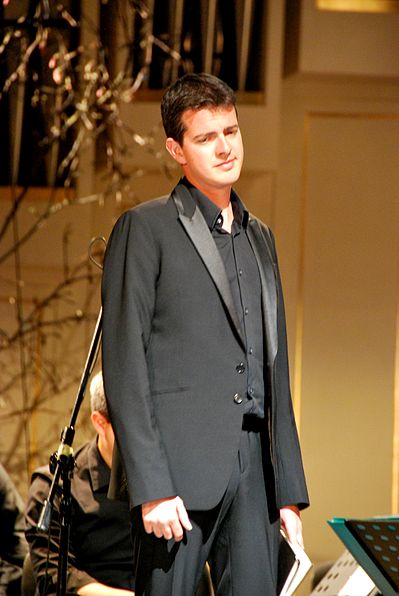Hoe ziet de toekomst van de opera eruit? De Nationale Opera probeert hierop een antwoord te formuleren in het Opera Forward Festival: new visions new voices, dat dit jaar voor het eerst wordt georganiseerd ter gelegenheid van het vijftigjarig bestaan. Het tiendaagse festival gaat 15 maart van start met de wereldpremière van Only the Sound Remains van Kaija Saariaho.
Over deze op het Japanse Nôh theater gebaseerde double-bill sprak ik eerder met de Fins-Franse componiste. Deze kleinschalige productie wordt geregisseerd door de controversiële Amerikaan Peter Sellars. De hoofdrol in beide korte opera’s wordt gezongen door de Franse countertenor Philippe Jaroussky. Na afloop van een repetitie vroeg ik hen naar nut en noodzaak van dit festival.
Philippe Jaroussky, ‘Only the Sound Remains’ is de opening van het Opera Forward Festival, in hoeverre bevordert deze productie de toekomst van opera?
Peter Sellars zei op de eerste dag van de repetities: ‘Veel mensen denken dat het verhaal van de opera op zijn einde loopt, maar dit is pas het begin!’ Dat vond ik verrassend. Hij heeft een open geest en deze productie toont wat we kunnen doen. We hebben maar twee zangers, een vierkoppig koortje, zeven instrumenten en elektronica om deze ontroerende verhalen uit het Nôh theater tot leven te wekken. Deze elementen herbergen alle mogelijkheden die we in de toekomst kunnen onderzoeken.

Opera bestaat niet alleen bij de gratie van grote voorstellingen, maar gedijt ook in deze intieme setting. Die intimiteit spreekt mij enorm aan, daarom heb ik besloten mee te doen: we kunnen werkelijk diepgravend werken. Natuurlijk kan opera betekenen dat je groots uitpakt, zie de productie van Moessorgsky’s opera Chovantsjtsjina die ook onderdeel is van het festival. Maar het kan dus ook gaan om deze twee kleine stukken die minder dan een uur duren en waarin we een wereld vol magie verkennen.
Wat precies is zo nieuw aan deze productie?
Ik zing de muziek van Kaija Saariaho voor de eerste keer en ben diep onder de indruk van haar kennis van texturen, kleuren. Zij onderzoekt alle mogelijkheden van elk instrument. Wat ik ten diepste ervaar is dat dit niet haar eerste opera is en dat zij enorm bedreven is in het verklanken van tekst. Natuurlijk is dit soort muziek wat lastiger in te studeren, het kost meer tijd het uit je hoofd te leren. Maar als je het stuk eenmaal goed kent, is het helemaal niet moeilijker dan een opera van Händel of Mozart. Sterker nog, het is zelfs makkelijker, omdat alles uitgeschreven is en het meer een gesproken dialoog is.
Ik ben super opgewonden, want dit is de eerste keer dat mijn stem met behulp van een computer bewerkt wordt. Dat gebeurt live en ik heb het gevoel dat ik me veel meer kan concentreren op de helderheid van mijn stem en zo kan spelen met de elektronische effecten. Elke uitvoering zal daardoor anders klinken. De elektronica is zeer verschillend in beide delen. In het eerste deel ‘Always Strong’ worden mijn zanglijnen zo gemanipuleerd dat ik weliswaar heel hoog zing, maar toch heel laag klink, een bijzondere ervaring.
Peter Sellars, hoezo is juist opera het genre van de toekomst?
Elke dag horen we het nieuws van de wereld, en dat is verpletterend. Elke dag worden we teleurgesteld in onze leiders, teleurgesteld in hele delen van de maatschappij. We worden ook teleurgesteld door onszelf. We worden teleurgesteld over het onvermogen ook maar enige soort van harmonie op de wereld te bereiken. En deze verbazingwekkende kunstvorm gáát over hoe mensen harmonie bereiken. Over mensen die samenwerken. Over mensen die een manier vinden om naar elkaar te luisteren en een snaar bij elkaar te raken. Niet alleen op vriendschappelijk vlak, maar op een diep niveau van wederzijds begrip en overeenstemming.
Om dat te begrijpen moet je natuurlijk weten dat alles een dans is. Alles is beweging, je beweegt met iemand. Het gebeurt niet alleen, het betreft een uitwisseling, een gedeeld universum, gedeelde ruimte, gedeelde ademhaling, gedeelde extase, gedeeld plezier en een gezamenlijk doel. Er is geen andere kunstvorm dan opera die dit bewerkstelligt. Opera brengt al deze mensen samen, om te zeggen: okay, wat kunnen we samen bereiken?
Maar dat geldt toch net zo goed voor een opera van Wagner of Verdi?
Dat weet ik nog zo net niet. De Wagner en Verdi opera’s zijn geschreven vanuit een negentiende-eeuwse top-down machtsstructuur. In het stuk dat Kaija gemaakt heeft ontmoet iedereen elkaar als gelijke. Je ziet de fluitspeler en de danseres elkaar als gelijken ontmoeten, je hebt Philippe, die geweldige kunstenaar die al die ongelooflijke dingen aanbiedt in prachtige duetten met de kantele-speler, met het strijkkwartet.
Iedereen ontmoet elkaar als gelijke, onze generatie ervaart minder die wilde, waanzinnige fysieke druk. In de negentiende eeuw voel je een sterke behoefte om over de top te gaan. In het hier en nu hebben we juist de behoefte met elkaar te leven en te genieten van elkaar. De toon, de temperatuur is bescheidener. – Als een paradijs op aarde, niet slechts een dagje in de hemel.
Denkt u dat het publiek dit zal invoelen?
Ik maak me nooit zorgen om het publiek, ze zijn ok. Het zijn allemaal diep voelende, menselijke wezens en zij zullen iets ervaren dat totaal buiten alles ligt wat ik zelf ervaar. Dat is ware poëzie: er is niet één manier om haar te begrijpen. Iedereen vindt een eigen ingang en ontdekt zijn of haar magisch universum. Dat is de schoonheid van kunst!
Een overzicht van alle activiteiten vind je hier.
Peter Sellars is op 17 en 18 maart ook de spreker tijdens de serie Scherpdenkers in Muziekgebouw Eindhoven en Concertgebouw Amsterdam; Reinbert de Leeuw speelt Via crucis van Franz Liszt.
